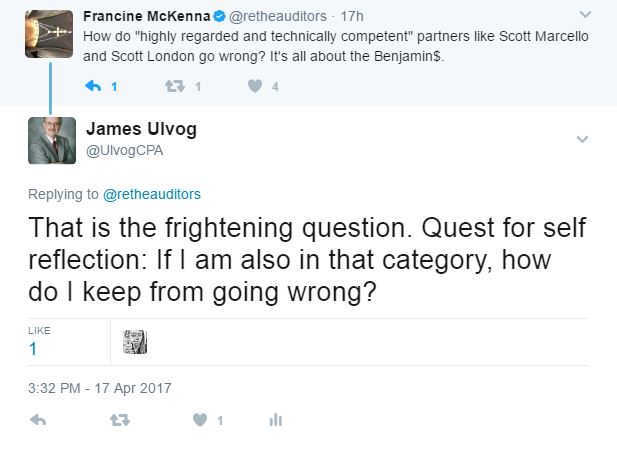
There is little new information on the leak from PCAOB to KPMG since the first reports.
I’m expecting to hear a lot more, most likely after PCAOB and SEC finish their investigation. If I read this situation correctly, and if public reports are correct, there will be sanctions from SEC against some of the KPMG staff. At that point, the SEC public documents will tell us a lot more.
While we wait, here are two articles that give some general background.
4/17/17 – Francine McKenna at re:The Auditors – KPMG takes its turn with a Big 4-sized scandal – If you’ve been looking for an article with a long time horizon to survey the assorted scandals in the Big 4 world, this post will give you the deep background you want.
Leak from PCAOB to KPMG
Post describes the current information that is public on the leak of inspection engagements from someone at PCAOB to someone at KPMG. Article illustrates there still is not a lot visible in the public realm to answer all the questions that come to mind.
Ms. McKenna quotes my comment earlier on the PCAOB-KPMG leak feeling to me like a red flag of something deeper. She agrees with me.
Each firm has their own round of fiascos
All the firms have had their turn of embarrassing publicity, often with fines or undisclosed settlements.
A few mentioned for KPMG include auditing banks with massive legal problems (Deutsche Bank), large money laundering messes (HSBC), or sundry other frauds (Fannie Mae).
Deloitte settled on the Taylor Bean & Whitaker audit (someday I’d like to describe that in detail – it’s a sad tale), got dings by PCAOB, paid $10M to NYDFS along with one year ban on consulting to banks.
Article says at the start of 2016 PwC faced three life threatening lawsuits. Two have been settled.
Article provides an intro to the mess with Deloitte Brazil altering workpapers before a PCAOB inspection.
One paragraph provides a quick tour of the insider trading charges against very senior staff, including KPMG (Scott London), EY, Deloitte, and Deloitte again.
You might want to bookmark the article so you can go back to it.
Even better, file a copy of the article in your Evernote database so you can easily pull it up next time you need to look up a Big 4 fiasco.
Not using Evernote to build your personal library? Check out Charles Hall’s primer articles at CPA-Scribo to get started.
Overall perspective
I’ll quote two comments from the article:
It’s a terrible joke on investors and the capital markets that PwC’s screw-up regarding Oscar envelopes got more mainstream coverage than any of the stories I mentioned previously.
Why does the PwC fiasco on the Oscar envelope gather massive publicity while only a few auditors and fewer finance people know anything about the combined serious mess in Deloitte’s audit of Taylor Bean & Whitaker and PwC’s audit of Colonial Bank?
I think the main reason is that the Oscar flub is so easy to explain. There is good video, too. Multiple self-incriminating, entertaining cellphone photos.
On the other hand, it would take a really long explanation to describe the fiascos at TB&W and Colonial Bank, including a discussion of what constitutes a good confirmation effort.
An auditor would instantly understand why one email is a lousy test for the existence assertion for somewhere around a billion dollars of loans. (Yes auditors, it is that bad.) How many people would read a 1,000 word explanation on why that one specific issue (amongst many others that could be discussed) is an issue?
Another good quote:
Major settlements and occasional infamy is an acceptable cost of doing business they can handle, as far as we know.
In other words, taking your turn in the public stock and having rotten tomatoes thrown at you is okay once in a while. Writing a multi-million dollar settlement check is also okay once in a while.
By the concept in that quote, the big checks and bad PR are merely a cost of doing business.
Some background on the most senior partner fired from the KPMG fiasco
4/17/17 – Michael Rapoport and Dave Michaels – KPMG’s Star Auditor Falls Hard – Background article on the departed Vice Chair of Audit paints a picture of a talented technician who advanced through the ranks to national head of the financial services area before moving to the senior auditor of the firm. His background is auditing banks and insurance companies, which in my humble and irrelevant opinion, are the most challenging industries to audit. He served in a two year fellowship at the FASB, which you know means he was widely known to be brilliant, extremely knowledgeable, and a superb technician before starting the stint there.
For you to ponder
Here is some discussion on Twitter:
There is a question arising in the current mess that each of us ought to ponder at length.
First, let me set up the situation. The Vice Chair of Audit at KPMG is an experienced, capable, very sharp technician. From the article, looks like he has a stellar career. He has heavy experience in auditing banks and insurance companies, which are technically very complex. Was fortunate enough to have a two-year fellowship at FASB. What an incredible learning opportunity that was! Working in the top audit position in the firm. Likely making more money than he ever dreamed possible. Probably one of the brightest audit technicians in the country, and that is a massive compliment.
Yet, assuming everything we see in print is precisely correct, he went terribly wrong. While at the peak of his career, again assuming the public reports are actually correct, he took devastatingly wrong actions.
So here is the question: If you are also in the midst of a wonderful career, well regarded, highly competent in your field, with an even brighter future ahead of you, how do you avoid making a horrible mistake that will destroy your career, your reputation, your current finances, and your retirement?
How do you avoid walking down that same path?
Please, please, please figure out an answer to that question.
